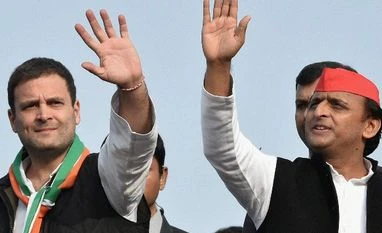Campaigning comes to an end for the third phase of Uttar Pradesh assembly elections today evening. As many as 69 seats across central UP’s Lucknow, Kanpur, Sitapur, Mainpuri, Etawah and adjoining districts will vote on Sunday. Samajwadi Party and Congress workers in the region are nervous. They fear a Hindu consolidation for Bharatiya Janata Party (BJP). The BJP believes the third phase will mark a revival of the party after a tepid response in the first two phases.
In the cities and towns of central UP, there is a positive buzz for Chief Minister Akhilesh Yadav but the alliance’s hopes rest more on the mistakes of its rival. The alliance has tried to tap into the anger on the street for Narendra Modi government’s note ban decision, the perceived non-performance of BJP’s Lok Sabha members of Parliament and the infighting in that party’s ranks because of faulty ticket distribution.
But the cadres are also discovering a groundswell of support from the upper castes who wish deliverance from the “Ahir-Muslim” rule of the last five years. The BJP is sure that the patchwork of caste coalition of upper castes and non-Yadav OBCs would help it win majority of the seats in the region.
1. Hindu consolidation
In this election, Shah has promised closing down of all slaughterhouses. In UP, slaughterhouses are owned by Muslims. In several towns, these are located not far from residential colonies and an eyesore for the mostly vegetarian Hindu upper castes and have become an emotive election issue.
However, Hindu consolidation on the lines of 2014 is still missing. In western UP, the Jats recovered from the bout of Hindutva they suffered in 2013-14. According to reports and feedback with parties, they have gone back to vote for Rashtriya Lok Dal.
In the central region, the BJP has reached out to non-Yadav OBC castes of Kushwahas, Kurmis, Rajbhars, etc. But demonetization could hinder the Hindutva march.
2. Note ban
Is demonetization a factor? It depends on whom you ask the question. A traditional BJP supporter is willing to forgive Modi, as long as the “upstart” Ahirs, or Yadavs, who are disrespectful towards them, and Muslims, who are “converting UP into a Pakistan”, are taught a lesson. The traditional BJP supporter is also likely to be salaried and economically better off. BJP’s Vaishya support base is upset but might not ditch the party. In his public rallies, Akhilesh Yadav consistently reaches out to the trading community.
But daily wage earners, rickshaw pullers and auto-rickshaw drivers do not come across as that forgiving. These are also more likely to be Dalits and OBCs. They share their anger openly. Apart from the ‘pain’ that the decision caused, what has hurt more is the PM’s failure to deliver upon the promised ‘gains’. The public at large had expected to be treated to arrests of big fish for hoarding black money.
3. Non-performance of BJP MPs, poor candidate selection
BJP’s rivals make it a point to ask people whether the local BJP Lok Sabha member been responsive to their needs. The answer at several places is in the negative. Cadre is ademoralisedized on several seats because 80 outsiders and children of leaders were preferred.
4. Chinks in SP-Congress alliance
The Congress might have helped SP consolidate its Muslim support base, but the party has brought precious little to the table. The synergy is only apparent wherever Muslims comprise a sizeable chunk of the cadres of the two parties. SP cadres, brought up on a diet of anti-Congressism, are upset. Similarly, the Congress leadership is Brahmin in several places and uncomfortable with sharing space with Yadavs.
5. Anti-incumbency and law and order
The family feud seems to have achieved its objective. Without the episode, it was likely SP could have been wiped out. Anti-incumbency against Akhilesh Yadav government is largely absent. People praise the work on road construction and improving the power supply.
However, the poor law and order record is hurting SP. In his public rallies, Akhilesh Yadav addresses this at length by pointing out his recent initiatives to improve policing.
6. Split in Muslim votes
The split in Muslim votes is a reality on several of the seats where the Bahujan Samaj Party has fielded Muslim candidates. The SP-Congress alliance is also wary of accusations that it represents only the aspirations of the Muslims.
The overarching narrative of the elections is the struggle that all three contenders – the BJP, SP-Congress and BSP – are facing in going beyond their respective traditional support bases. This is where BJP senses the opportunity by attracting non-Yadav OBCs and non-Jatav Dalits to its fold. It had tried this in Bihar but had failed.
The lack of a clear picture has made political observers in UP conclude that the state is headed for a hung assembly.
To read the full story, Subscribe Now at just Rs 249 a month
Already a subscriber? Log in
Subscribe To BS Premium
₹249
Renews automatically
₹1699₹1999
Opt for auto renewal and save Rs. 300 Renews automatically
₹1999
What you get on BS Premium?
-
Unlock 30+ premium stories daily hand-picked by our editors, across devices on browser and app.
-
Pick your 5 favourite companies, get a daily email with all news updates on them.
Full access to our intuitive epaper - clip, save, share articles from any device; newspaper archives from 2006.
Preferential invites to Business Standard events.
Curated newsletters on markets, personal finance, policy & politics, start-ups, technology, and more.
Need More Information - write to us at assist@bsmail.in
)